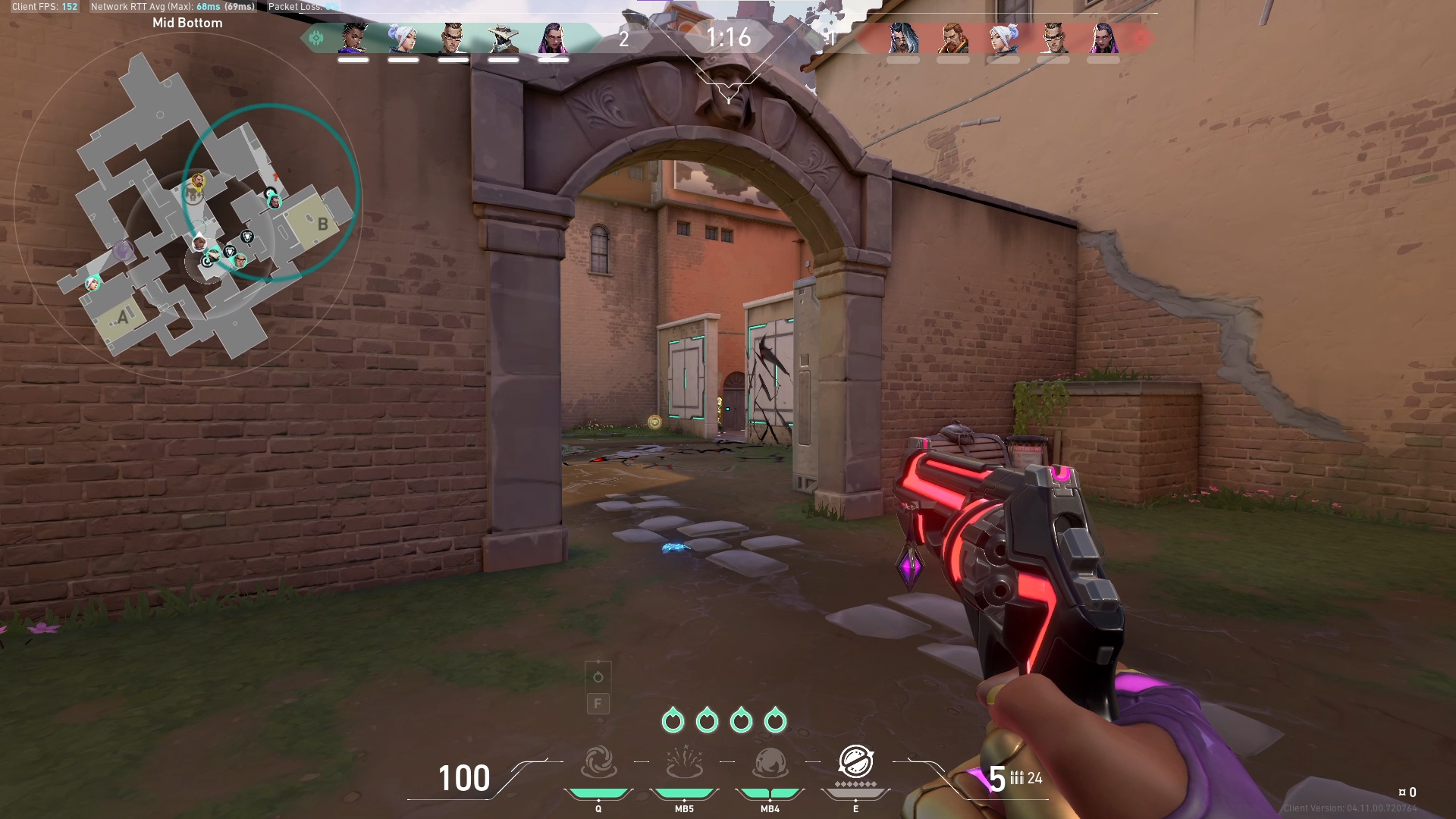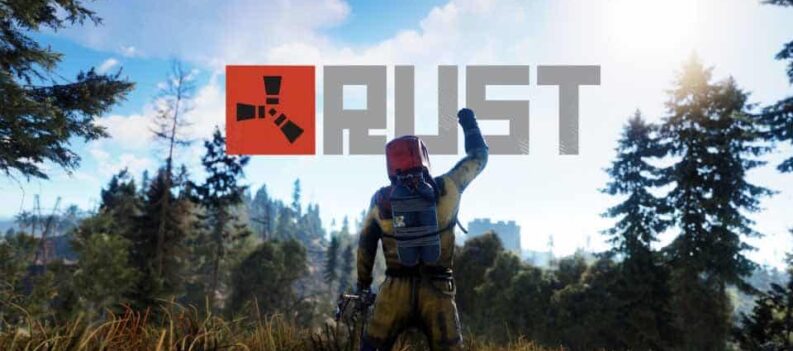Graveyard Keeper is, in essence, Stardew Valley for goths. Its hard not to draw comparisons between the two; beyond the visual parallels, in place of harvesting crops and making jams and cheese, you’ll butcher corpses, selling their trimmings at the local tavern and turning their fat into candles to adorn your church. While the game’s morbid humour and inventive adaptation of Stardew Valley’s addictive loop offer an initial draw, an arduous, bloated approach to progression mires the experience, resulting in a grind unworthy of investment.
The victim of a hit and run, you find yourself in a dilapidated medieval cemetery, charged with its upkeep. A floating skull named Gerry dishes out advice, acting as your guide as you come to terms with your odd circumstances and the game’s many complex systems. At first the opportunity to craft more, build more and gather more than games like Stardew Valley was an exciting prospect but it soon became apparent managing all these duties would be paramount to a real-world job.
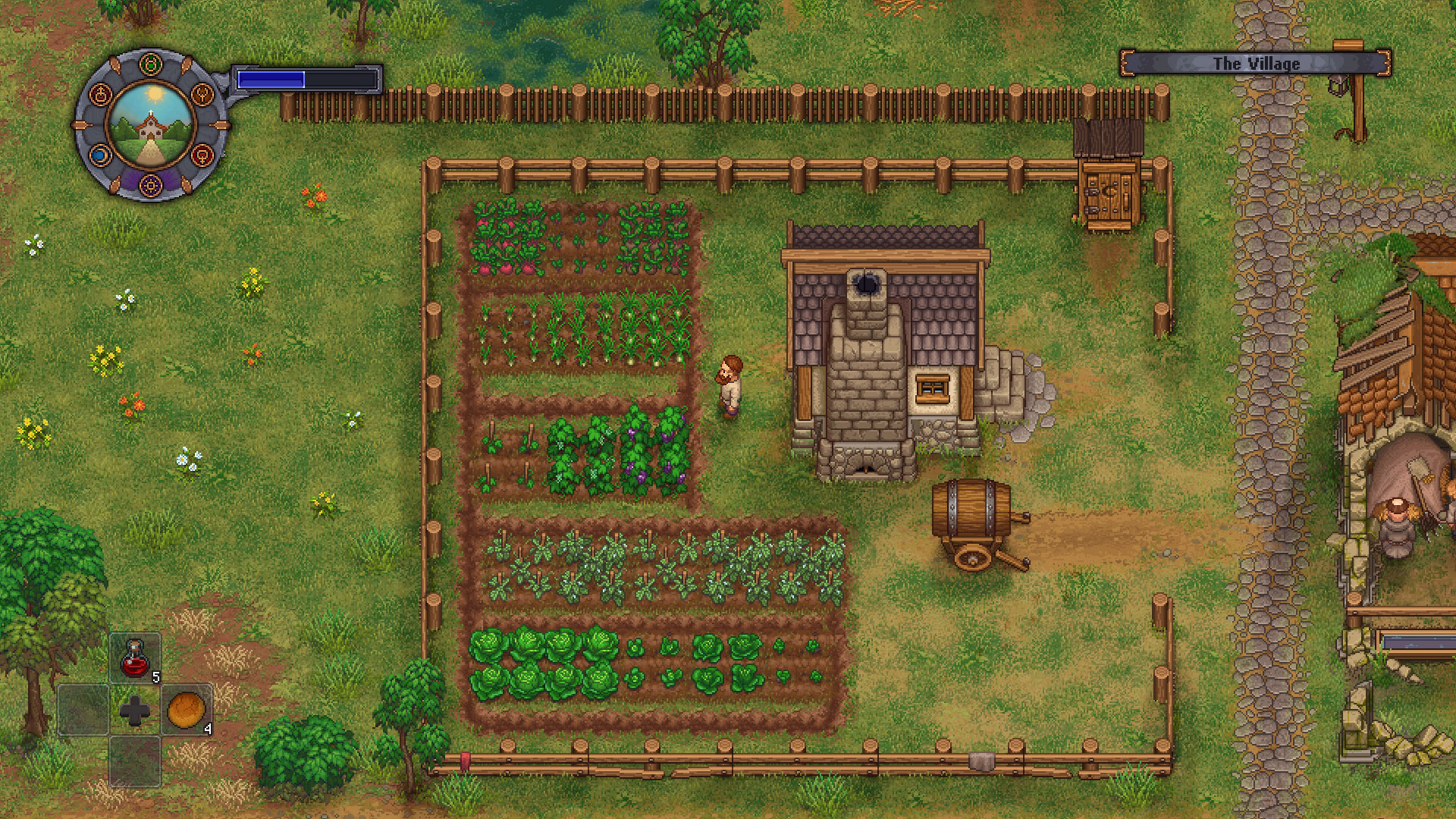
Your morgue, graveyard, church, garden, and yard all demand attention but each stage of development required to make these lots profitable consists of several steps in between. It took me several hours before I could find the money to purchase seeds, to grow vegetables, and even then I wasn’t able to sell them until I unlocked a trade agreement which cost yet more money. Graveyard Keeper is riddled with quest structures that seem intent on hindering you at every turn.
Case in point; At the very beginning of the game you’re advised that you need a stamp before you can sell your human corpse-meat as non-human corpse-meat. Selling meat seemed to be one of two ways to get money early on in the game, so I set out to get that stamp. This entailed meeting Snake, only reachable by clearing a blockage in an underground labyrinth which required resource farming. Huzzah! Time to get that stamp… No. Snake will not talk to you unless you have enough faith.
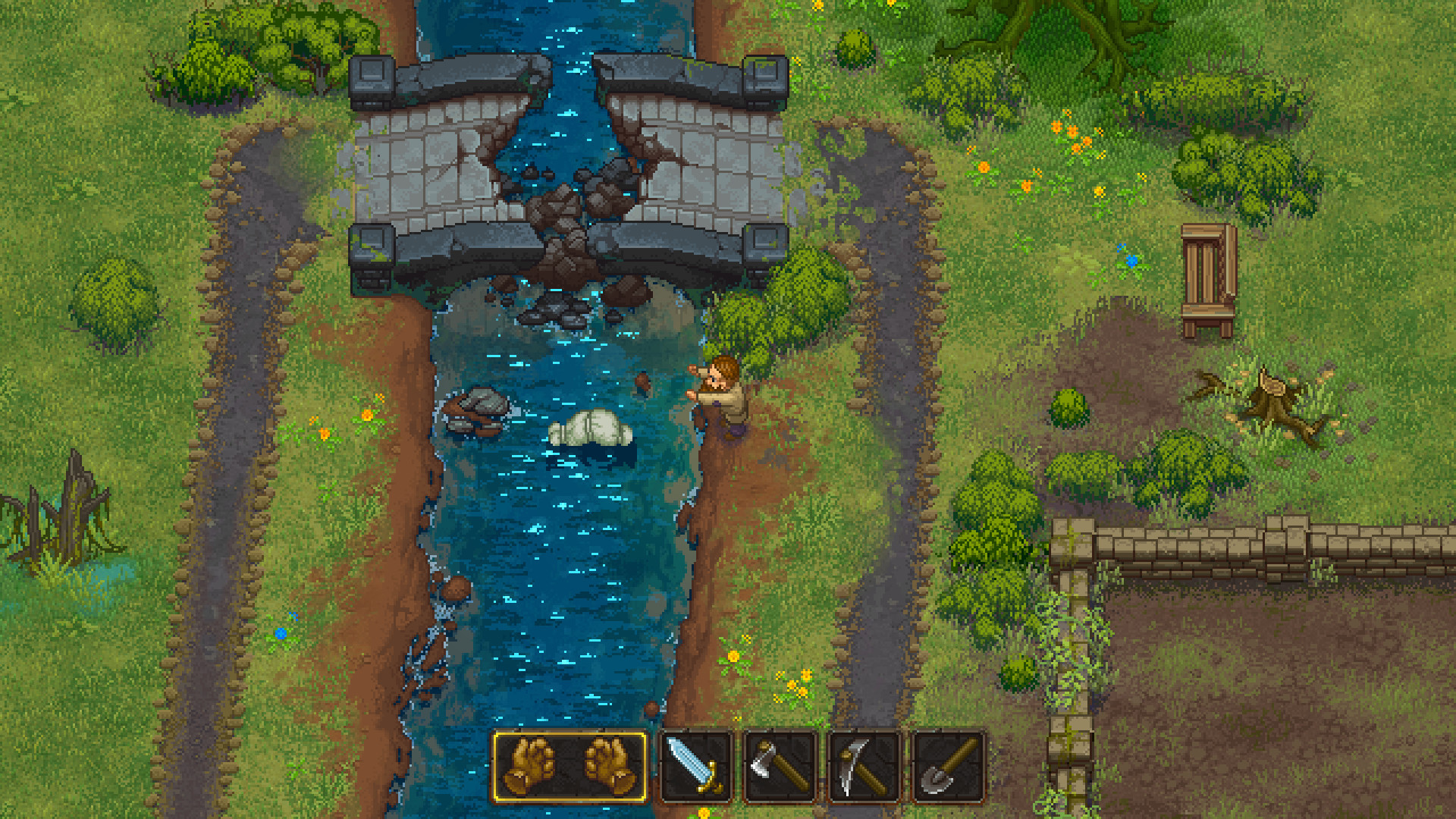
Faith can only be earned from your congregation which requires a church, only unlocked when the graveyard is improved, which of course costs money. But surely once you’ve done all that you can get the stamp right? Wrong. You have to do a number of tasks for Snake, each equally long and costly, before you can finally get the stamp. When you get the stamp and try to sell the meat, the cycle starts anew as you learn the meat must be wrapped in paper that you have to craft.
Although the arduous path to each task’s goal can make its completion satisfying, I found myself sighing when loading up the game, knowing full well I would be playing for hours to complete one relatively insignificant task. While the main story lasts roughly 40-50 hours, taking on the game’s many side quests can double this playtime. Side quests are at times a necessity to gain resources but often simply offer a quicker path to gratification, something I found myself starved of among the grind. Combat is similarly plagued with banality; extensive preparation is required and you frequently die, although little punishment is incurred for falling in the fray.
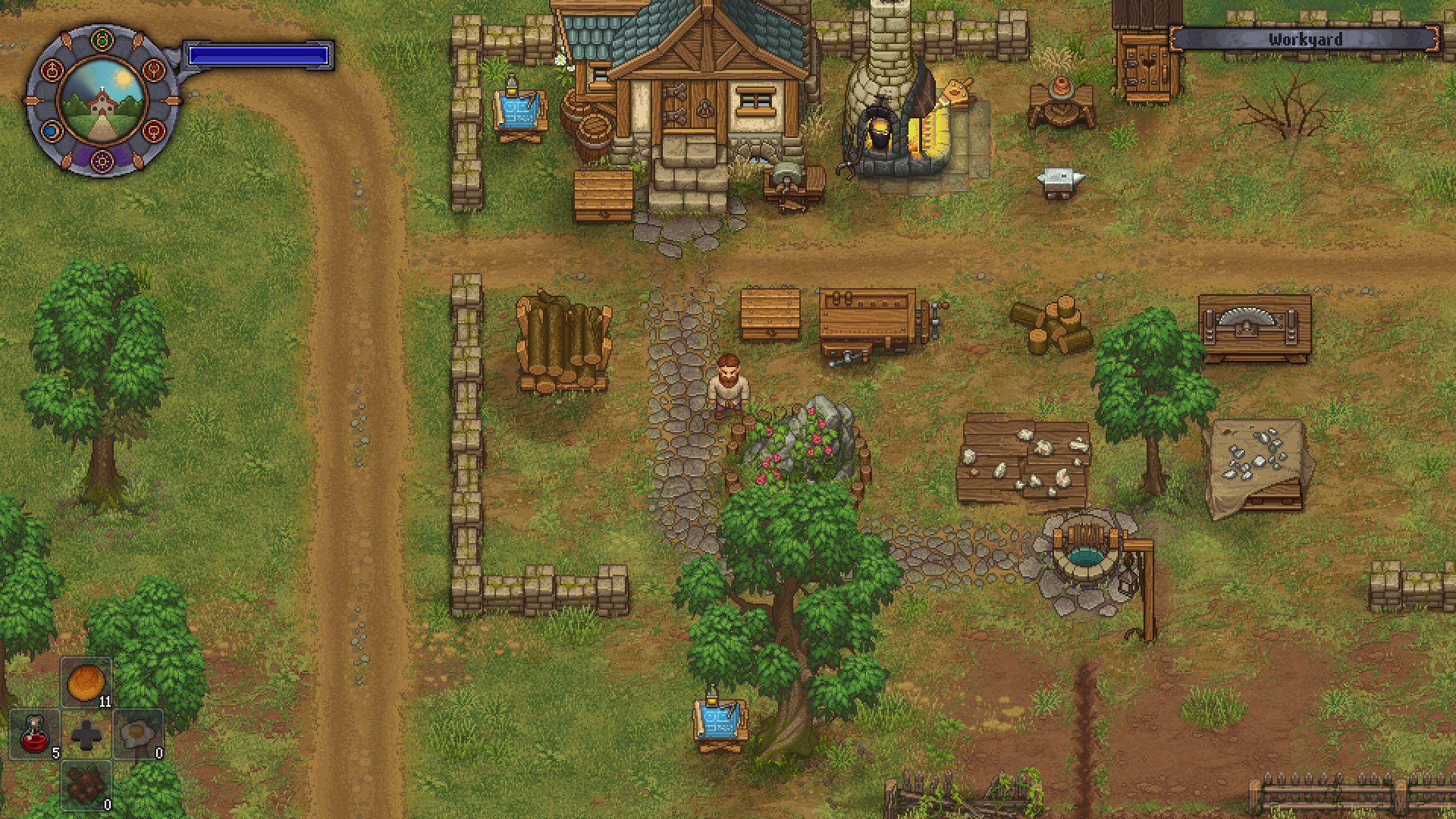
Escaping your fate and getting home is your only incentive for all this busy work. While the first few hours offered some intrigue, Graveyard Keeper’s 2D characters and lack of charm failed to maintain my investment in its sparse narrative. NPCs are, for the most part, void of personality, functioning solely to dish out quests and populate a map that feels expansive yet empty. Venturing to new areas is also punished; gaining admittance to the town entailed a long-winded process, familiar to me by now, yet when I finally made way to this new destination I was struck down by lightning, only to awake back in my home. While this narrative device highlights the futility of your efforts, it feels like a cruel joke played on the player, especially when it is recycled to tease you with the fort, a similarly unreachable new haven.
The game’s one successful innovation is in its skill tree. Most of your actions in the game earn you skill points that can be spent on different technologies. These are split into; Anatomy & Alchemy, Theology, Book Writing, Farming & Nature, Smithing, Building, and Cooking. Each expansive tree offers plenty to unlock, making for an addictive gameplay loop that pairs the progression of an RPG with the compulsion of a management sim. In a better paced and overall more enjoyable sim game this system would be complimentary to the genre’s core mechanics, yet here it does little to alleviate the grind and tedium.
Graveyard Keeper is a game for sadists. While at times I felt compelled by its gameplay loop, ultimately I felt begrudged in my perseverance. Hardcore sim fans will find something to enjoy in this arduous adventure, but poor pacing, monotonous progression and a world that lacks charm make this less graveyard keeper and more graveyard shift.
Graveyard Keeper PS4 Review
-
Overall - Good - 6/106/10
Summary

Graveyard Keeper is Stardew Valley’s goth younger brother; full of promise but ultimately held back by a meandering approach to getting things done. This addictive, complex sim game has a wealth of content and offers some inventive systems that enhance the genre but after dozens of hours the monotony of its grind was the final nail in the coffin.
Review Disclaimer: This review was carried out using a copy of the game provided by the publisher. For more information, please read our Review Policy.
Reviewed using PS4 Pro.







